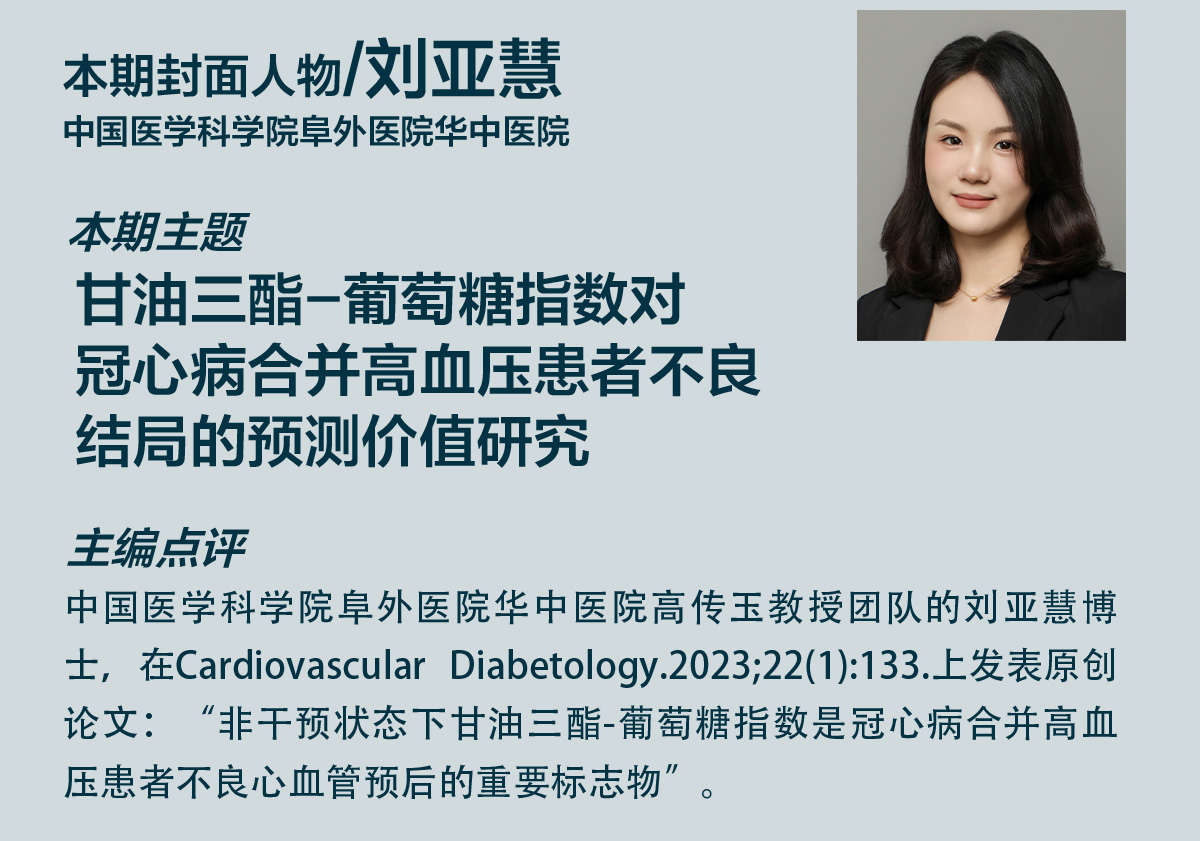
Background: The Triglyceride-Glucose (TyG) index is a composite measure derived from fasting triglycerides and fasting glucose levels, calculated using the formula Ln [fasting triglyceride level (mg/dL) × fasting glucose level (mg/dL)/2]. Introduced in 2008 as a simple and cost-effective biomarker, the TyG index was initially used to identify insulin resistance. Given the close relationship between insulin resistance and cardiovascular diseases, numerous studies have explored the correlation between the TyG index and cardiovascular diseases. Recent research indicates that the TyG index is an independent predictor of various cardiovascular events and adverse outcomes, highlighting its potential in predicting cardiovascular risk.
Objective: There is a lack of evidence on whether the TyG index can predict adverse outcomes in patients with coronary heart disease and hypertension. This study aimed to explore whether the TyG index has predictive value for major adverse events in these patients.
Overview: The study by Dr. Liu Yahui and colleagues was a single-center, prospective, observational clinical study that included 1,467 patients aged 18-75 diagnosed with coronary heart disease and hypertension. All patients were followed for one year, with the primary endpoint defined as the occurrence of all-cause mortality or non-fatal cardiovascular events within one year. Patients were divided into three groups (T1, T2, T3) based on TyG index tertiles. The results showed that patients with higher TyG indices had a higher proportion of adverse events (T3 vs T1=15.0% vs 6.9%). Moreover, after adjusting for various confounding factors, the TyG index, whether as a categorical or continuous variable, was significantly associated with the risk of adverse cardiovascular events in these patients. As a continuous variable, there was a significant dose-response relationship (non-linear P=0.632) between the TyG index and the risk of adverse events; each standard deviation increases in the TyG index was associated with a 28% increase in the risk of major endpoint events [HR=1.28, 95% CI:1.04-1.59]. In summary, the TyG index can serve as an independent predictor of adverse cardiovascular outcomes in patients with coronary heart disease and hypertension.
Commentary: In 2023, the Chinese lipid guidelines highlighted that LDL-c is a crucial therapeutic target for patients with coronary heart disease (CHD) and also emphasized that for high-risk ASCVD patients whose triglyceride (TG) levels remain elevated despite statin therapy, adding high-purity eicosapentaenoic acid (EPA), high-purity ω-3 fatty acids, or fibrates could help reduce ASCVD risk. The advantages of TG and TyG, such as ease of acquisition and low cost, have made them increasingly popular among researchers. Numerous studies have shown that the TyG index can predict the occurrence of various diseases, including diabetes, hypertension, coronary heart disease, and ischemic stroke, as well as their adverse clinical outcomes. Research by Dr. Liu Yahui and colleagues was the first to demonstrate that the TyG index, independent of traditional risk factors, can also serve as a predictor of adverse cardiovascular events in patients with coronary heart disease and hypertension. This suggests that, for patients with both coronary heart disease and hypertension, regardless of whether they have diabetes, it is important to not only strengthen the control of traditional risk factors such as blood pressure and blood lipids but also to closely monitor the dynamic changes in the TyG index to potentially improve long-term outcomes. As a promising biomarker for assessing insulin resistance and cardiovascular disease risk, the TyG index holds significant potential value in cardiovascular risk assessment and management. This research provides a theoretical basis and practical experience for further clinical interventions targeting TG.
刘亚慧,医学博士,博士后在站研究人员,河南省心血管创新与转化专业委员会委员 专业方向:心血管病学,自2017年起,加入高传玉教授科研团队,围绕“高血压的发生发展机制和治疗”的研究方向开展临床及基础研究,完成国际注册临床研究1项,共发表SCI论文6篇、国内核心期刊论文2篇。 参与省厅级项目2项,参与获得河南省医学科技进步一等奖1项,参与申请发明专利2项、实用新型专利4项,参编专著1部。
邮箱:liuyahui0708@163.com
Liu Yahui, MD, PhD, postdoctoral research fellow, Member of the Henan Provincial Committee for Cardiovascular Innovation and Translation. Profession: Cardiology. Since 2017, she has joined research team of Professor Gao Chuanyu, focusing on clinical and basic research on the mechanisms and treatment of hypertension development. Has completed one international registered clinical study and published six SCI papers and two papers in domestic core journals. Involved in two provincial department-level projects, participated in one project that received the First-Class Award for Medical Science and Technology Progress in Henan Province, participated in the application for two invention patents and four utility model patents, and co-authored one monograph.
Email:466477098@qq.com